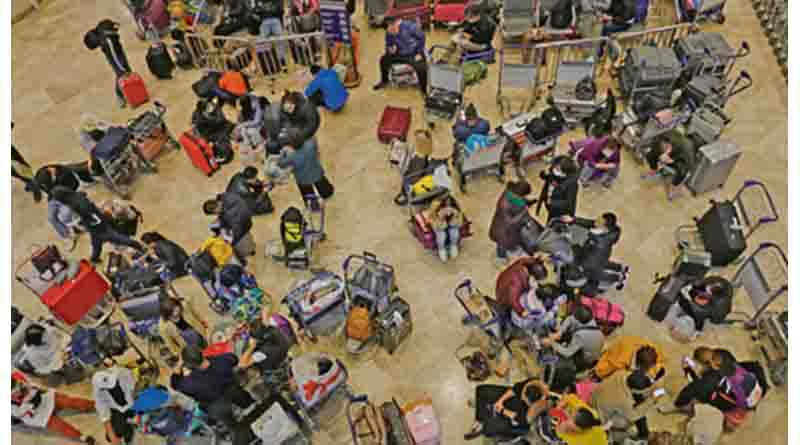nCoV-Sparked Ban Strands OFWs, Foreign Travelers

HUNDREDS of overseas Filipino workers (OFWs) and foreign travelers were stranded by the government’s abrupt issuance of a travel ban for China, Hong Kong and Macau during the weekend in its attempt to curb the spread of the 2019 novel coronavirus (2019-nCoV) within its borders.
On Sunday, President Duterte ordered the imposition of an indefinite ban on non-Filipinos coming from the three areas from traveling in the country. Exempted were returning Filipinos and permanent visa holders, but these were allowed entry on condition of a 14-day quarantine.
The order also stopped Filipinos from traveling to China, Hong Kong and Macau.
During a media briefing in Malacañang on Monday, Bureau of Immigration (BI) spokesman Dana Sandoval said they implemented the instructions of Duterte to the letter, effectively stranding at least 300 Chinese nationals, who are on their way home, in local ports nationwide.
“Our office is coordinating with the Chinese embassy, and they have pledged to send an aircraft to fetch their citizens who are stranded in the country,” Sandoval said.
“Maybe today or in the next few days, we will find out the details of these flights that the Chinese embassy will be arranging,” she added.
Contradicting statements
The Department of Labor and Employment (DOLE) said the order also affected “hundreds of OFWs bound mostly for Hong Kong and Macau” as BI insisted that the ban covers all Filipinos regardless of their visa types.
This, despite the pronouncement of Philippine Ambassador to China Jose Santiago “Chito” Sta. Romana that Filipinos with work permits in China, Hong Kong and Macau will be exempted from the travel ban.
The contradicting policy pronouncement prompted migration stakeholders and the recruitment industry to demand that the Philippine Overseas Employment Administration (POEA) issue the necessary Governing Board (GB) resolution to clarify the details of the travel ban.
“For starters, the POEA needs to convene its Governing Board to convert this travel ban into a temporary deployment ban, while specifying the labor destination countries to be covered. The GB resolution should also indicate the category of workers to be affected,” Blas F. Ople Policy Center Head Susan Ople said in a statement.
“This is critically important because these workers have foreign employers. They also need to be informed about our government’s decision,” she added.
In a SMS, Estrelita S. Hizon, private sector representative at the POEA GB, said they have yet to receive any draft resolution related on the matter as of Monday afternoon.
Labor Secretary and POEA GB chairman Silvestre H. Bello III is currently in Kuwait negotiating for the full implementation of the Philippine-Kuwait memorandum of agreement (MOA) for the protection of Filipino household service workers.
Government intervention
Until the issue is clarified, Bello ordered the Overseas Workers Welfare Administration (OWWA) to provide P10,000 cash assistance to each stranded OFW affected by the travel ban.
Labor Undersecretary Renato Ebarle said the affected OFWs will be provided accommodation at the OWWA halfway house while arrangements for their travel to the provinces are being made.
In a related development, Foreign Affairs Undersecretary Ernesto Abella said they are now preparing for the repatriation of 42 Filipinos in Hubei, China, who have expressed a desire to return home as of the morning of January 3.
“The government is now negotiating to send an aircraft there in the affected areas. We expect it [repatriation] to start this week,” Abella said.
He said the exact date will depend on the approved arrangement with China, which earlier implemented its own lockdown in Hubei.
Quarantine protocols
Upon the arrival of the repatriated OFWs, Sandoval said they will be required to undergo the 14-day quarantine as recommended by the Department of Health (DOH).
Since the government has yet to designate the quarantine facility that will be used to house repatriated OFWs, Research Institute for Tropical Medicine Director Celia Carlos said the concerned OFWs, if they will not show symptoms of 2019-nCoV, may undergo home-based quarantine.
2019-nCoV symptoms include fever, cough and respiratory symptoms.
“So they stay at home, preferably separated from the rest of the household. If they can stay in a separate room, that’s much better. They are advised to wear masks for around 14 days, from the date of arrival until they complete the two weeks. If they have no symptoms, then that’s it,” Carlos said.
In case they show any symptoms of the 2019-nCoV, Carlos said they should go to a medical facility to undergo the necessary testing.
The Department of the Interior and Local Government (DILG) tasked barangay health emergency response teams to ensure the 14-day quarantine period for the newly arrived Filipinos.
Carlos confirmed that Fort Magsaysay in Nueva Ecija, is currently being considered by the government to become a quarantine facility for repatriated Filipinos from China, Macau and Hong Kong.
“In the interagency meeting last Friday, the plan was for a team from the DOH, from Quarantine, from Immigration, DFA to visit the prospective facilities that include Fort Magsaysay. So depending on the findings, the decision will be made on where to quarantine the returning Filipinos,” Carlos said.
HK and Macau domestic workers fear losing jobs
Majority of the estimated 250,000 Filipino domestic helpers in Hong Kong and Macau are worried they might lose their jobs if they go on vacation to the Philippines due to the travel ban to and from China.
According to recruitment consultant and migration expert Emmnanuel Geslani, household service workers who are on vacation in the country are concerned they might not be allowed to go back once their vacation is over.
“Unless Malacañang clarifies an earlier order that bans all Filipinos from traveling to mainland China and the two SARs,” Geslani said.
“Majority of the Filipinos have expressed that they would not go back to the Philippines now due to the new travel ban, Gesla said.
With Recto Mercene
Image Credits: Nonie Reyes
Source: https://businessmirror.com.ph



